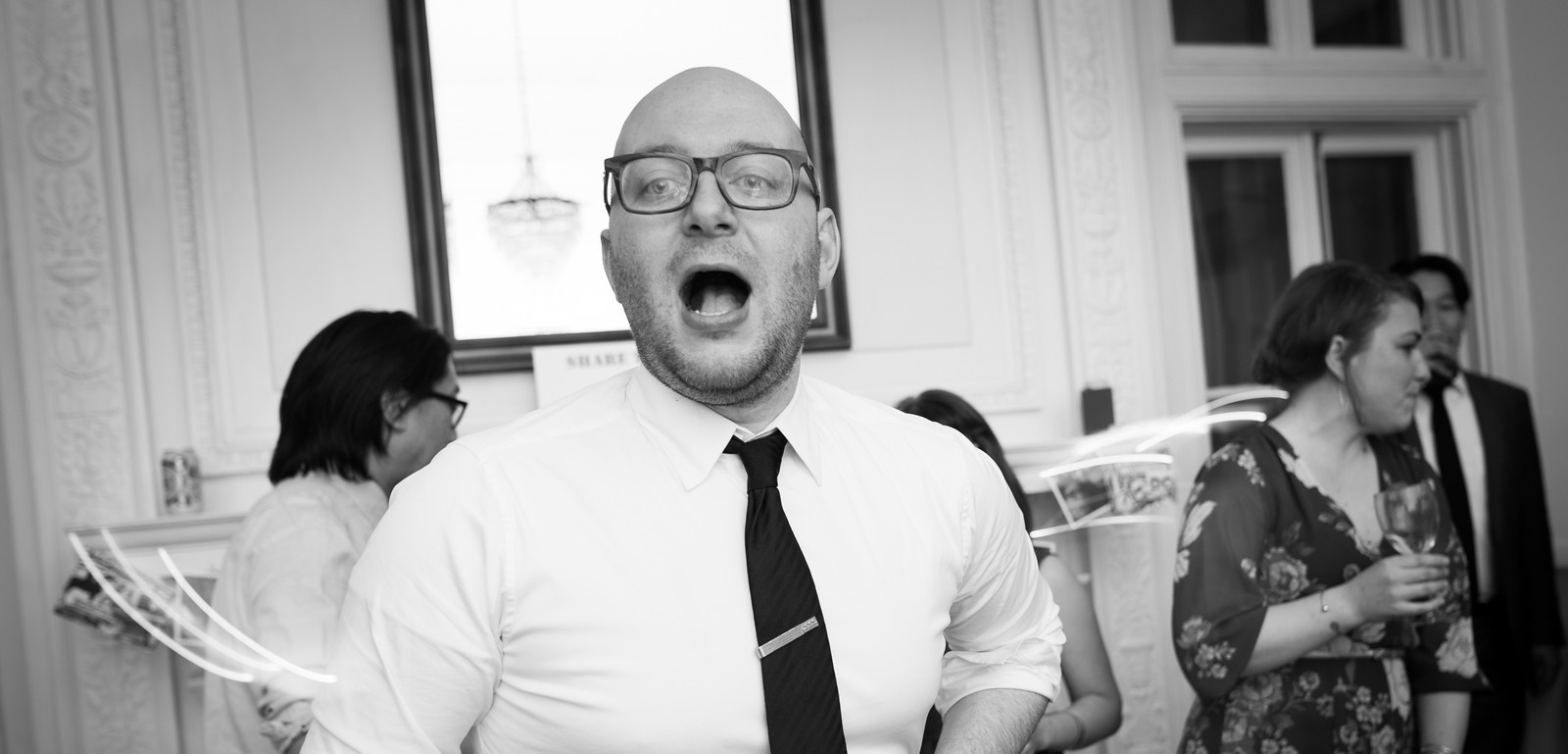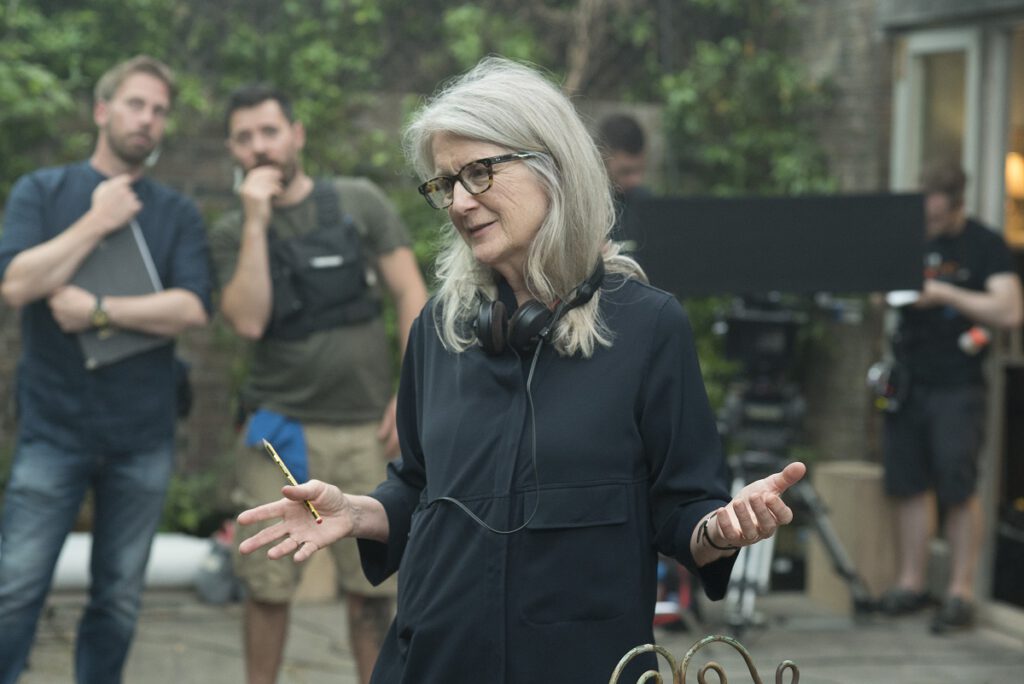Sally Potter made a splash with “Orlando,” an adaptation of a Virginia Woolf novel starring a then-unknown Tilda Swinton. Orlando is an immortal, living for centuries and even switching genders along the way. The film is a sly portrayal of how nations, attitudes, and personalities develop, or sometimes stay the same. Since then, Potter’s films have bucked convention and what is tolerable from a female filmmaker. Potter played herself in the sensuous drama “The Tango Lesson,” and a middle-aged woman playing a romantic lead is somewhat daring even today. “Yes” is arguably her most demanding film: the entire script is written in iambic pentameter, the language of Shakespeare, and the film ends with an American heroine abandoning her husband for Cuba and her Lebanese lover.
Her latest film is “The Party,” a dark comedy that eschews a broad canvas for a small, even claustrophobic setting. Kristin Scott Thomas plays Janet, a politician in London who is hosting friends for dinner after a key victory for her opposition party. While her husband Bill (Timothy Spall) wallows in an alcoholic stupor, her guests start to arrive. All of them have different, modern political viewpoints: Patricia Clarkson plays a hardened cynic, Bruno Ganz plays a new age healer, and Cillian Murphy plays an amoral financier (just to name a few). Everyone at the party has some secret, and the film follows the evening until they confront how their personal lives clash with their values. Potter recently spoke with me about her film, what it means to be political in this current moment, and fragile masculinity.
All the characters in “The Party” have distinct worldviews, as well as distinct personalities. When you were writing the film, which came first?
The characters come with their beliefs as part of who they are. I never thought of them as representing a particular ideology. While I was writing, I tried figuring out who they believed they were. Only then could I explore the gap between who they thought they were, and how they actually behaved. Nobody was representing a point of view, but living a set of beliefs they’ve developed over the years.
But were there any set of beliefs you definitely wanted to highlight?
I wanted to track what happens when people are not being entirely truthful. The idea of about how to tell the truth in political life, rather than spin semi-truths in order to get votes, was in the air [while I was writing]. Of course, the story unfolds in personal life, even though Janet is directly involved in politics. Then I wanted to explore all the issues related to health, because one character has a health a crisis. He says he has a terminal illness, and when you push something that far, a lot of beliefs about health, healthcare, the healthcare system, even love and responsibility come to the front of what everyone is thinking. Another theme was women in power—both for the women and the men in their lives —so I wanted look at the difficulties of being in a supportive role, as opposed to a leadership role. Things emerged [in the script] step by step after that.

The film seems to be written out of a sense of frustration, particularly frustration for the issues you just described. Do you find your sense of frustration to be furtive inspirational ground?
I think frustration, difficulty, and disappointment and rich areas to explore dramatically. The gap between people’s deepest ideas/longings, and the failures to achieve them, is a “hot” issue at the moment for anyone—anyone—who has spent time in opposition. By opposition, I mean protesting, or going on marches. Patricia Clarkson’s character seems very cynical at the beginning, but by the end, you realize she has passionate beliefs, and has been disappointed by what has not been achieved.
This is an idealistic generation, who protested about the Vietnam War, went on Women’s and Civil Rights marches, and even protested the War in Iraq—as I did. The government went in the opposite reaction each time. The question then comes up: How DO you do it? How DO you make a difference? Why does it take so long? The other day, someone was asking me, “Why don’t things change faster for women in the film industry?” I thought I would remind myself of the dates of change in women’s history. We got the vote in 1920 – that’s not so long ago – and in Switzerland only got it in 1971. In Saudi Arabia, women only got the vote in 2015. If you think of it and the thousands of years before that, suddenly you realize there have been major changes in a couple of generations. In day to day, it can seem slower.
Many of your older films have had a political component to them, even when that wasn’t so much in fashion. Now it seems that so much popular entertainment and pop culture is trying to be a reaction to the Trump administration, to Brexit, whatever. How do you feel now that so many other filmmakers and creative people are catching up?
It is rather fantastic [chuckles]. You’re right: I have felt out on a limb, and I have been “accused” of being too political. Now it feels much more like the norm, and it’s so exciting. My younger friends— people in their twenties or thirties—are now discovering political life. They are full of passion, full of anger, and I love it! I think it’s great there’s this awakening that politics does not just happen in the Houses of Parliament, or the White House. Politics used to seem like a dusty, bureaucratic thing, but now more realize it’s like a living, more evolving organism.

How has your sense of politics changed as you’ve gotten older, particularly now that mixing the political with the personal is now more accepted?
There are two things I’ve noticed. In my day to day life, I cannot remain silent if I’m with someone who takes a different viewpoint about something I believe passionately. For example, I recently had a taxi ride in the UK and my driver was talking against immigration. I cannot remain silent, and go, “Yeah, uh-huh, uh-huh.” I get into arguments, to the point where I’ve had to leave the cab! I say, “Pull over, I’m not going to continue in this cab with you.” But I try and be cleverer in my arguments than that. But that’s just me, personally.
When I’m writing a script, I try very much to step very much into the shoes with whom I do not agree. I build the counter-argument, because that’s an important dramatic principle. If you only build the arguments with which you agree, you end something that’s sickly-sweet, or self-serving. Dramatic tension comes through conflict, and conflict is essentially a differing point of view. In “The Party,” I needed to put myself in the shoes of a cocaine-snorting male banker, and find in him the suffering humanity that is actually is there. I think Cillian [Murphy] did a great job with it—by the way, he is not at all like a right-wing banker.
I didn’t get the impression that his character was necessarily right-wing.
He talks about money, money, money. He even asks why pharmaceutical companies shouldn’t make money.

That’s probably just the difference between American and UK politics. The profit motive is so overwhelming here that it transcends ideology.
That’s true! I always forget that [laughs]. Anyway, in my mind, he was kind of a right-ish sympathizer. Within the arc of the film, he reveals the arc of his fragility. That’s the key, isn’t it? In order to look at people who are different, we must look with loving eyes at the humanity that coexists with these beliefs. Otherwise, we are dehumanizing each other, an act that’s not particularly useful. It is a conundrum, because there is a value in sticking up for what you believe, as long as you’re not too rigid about it. Whenever I hear people speaking from the heart about what they believe, I find it moving, especially if I agree with what they are saying [chuckles].
One thing I found interesting about Murphy’s character is that his drug habit—along with the pistol he is concealing—seem like alpha male traits, only to function as symptoms of weakness. It was a smart transition and spoke to how we think of traditional masculinity.
The key to his character is when he talks about winning and losing. He shouts, “I’m a winner! I don’t lose!” This pressure on the masculine ego to always look like a winner is a fantastic burden.
“The Party” is your first time returning to black and white photography since “The Tango Lesson.” How did it feel to return to it, and what do you think it brought to this film in particular?
In a certain sense, it was like coming home. My earliest experimental films were also in black and white; I made a lot of them. It’s a magical medium, and I love what it does to the brain. I find that color is only superficially realistic. In crisis situations, the eye is much more selective and does not see that much color in the brain. The design and cinematic principle, therefore, is to make things stronger by taking things away. What remains becomes much more intense, and full. Black and white strips color, but it also makes the whites more white and the blacks more black. That felt right for a film dealing with conflict, with what’s extreme.

It sounds like black and white sounds freeing, and yet “The Party” takes entirely within one setting, which runs the risk of being too theatrical. How did you make sure the shots and angles were always dynamic? What the rehearsal process like?
Before the actors came together, I rehearsed with each of them on a one-on-one basis. When we did come together, it was an opportunity for each person to feel the physicality and rhythms of the others. We were not blocking yet. It was more about talking through the characters, and their chemistry. When it came to the set, which was brilliantly realized by [production designer] Carlos Conti, he made a model so we could play with figures in it. We looked for all the different variations of each room, who would move through him, who would be in a given room at a particular moment. We plotted all those moves, so when we got into the space, I never plotted the movements rigidly. There was always freedom for the actors and my cinematographer to improvise where they would be. Still, some of the [action] had to be worked out quite carefully, because the actors had to run into each other, bump into each other, even hit each other.
In your other films “Yes” and “Ginger and Rosa,” you had English characters interacting with American characters. “The Party” has that, too, so I’m curious what you find so fascinating about how people from these two countries interact.
I’ve always found the relationship between American actors and English actors interesting. For the purposes of this story, which is set in London, any person’s living room will tend to have a mix of personalities and nationalities. That is absolutely realistic.
What’s the relationship between them?
English actors have a grounding in the theater. It’s an important tradition to them, so they invariably have a link to Shakespeare, as if it’s in their bones. They have a feeling for language, the spoken word, and the ensemble. The relationship to the camera comes more easily to American actors. America simply makes more films, and many of America’s best actors came alive in front of the camera, without really stepping onto the stage. When it comes down to it, all these actors must think about interior lives, but it’s been interesting for me to experience working with both. I’ve been a performer myself, so I understand what they are going through. It’s become a richer and richer process. They see my love for them in my eyes, so they feel my attention, my respect, and also my ruthless ability to push them into uncomfortable places.












